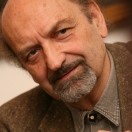György Szabados
György Szabados (1939–2011) was a Hungarian jazz pianist, and is sometimes referred to as the "father" or "unofficial king" of the Hungarian free jazz movement since the 1960s. Szabados was born in Budapest. Even though he started performing in 1962, his rise to fame is generally considered to have started with his quintet winning the renowned San Sebastian Jazz Festival Grand Prize in the free jazz category in 1972. His first album that was recorded with a quartet in 1975 was entitled Wedding. Despite the abstraction of the music, the record was well received in Hungary and abroad, thereby setting the scene for his subsequent albums. International recognition is probably noted by including the album in The Essential Jazz Records compiled by Max Harrison, Eric Thacker and Stuart Nicholson (Volume 2: Modernism to Postmodernism).Even though he could not record again until 1983, he maintained his status by establishing the Kassák Workshop for Contemporary Music, in which a new generation of musicians acquired a free and intuitive manner of playing jazz, with a distinct Hungarian sound. Generally, his collaborators would make up the next generation of Hungarian jazz, including acclaimed saxophone player Mihály Dresch. Further international recognition followed in the 1980s, through his collaboration with Anthony Braxton on their duo record Szabraxtondos. In Hungary, he proceeded to form MAKUZ, or the Royal Hungarian Court Orchestra, which membership varied, but always consisted of at least nine musicians that were committed to free, improvised music. Subsequently, he still collaborated with Roscoe Mitchell on their 1998 record Jelenés (Revelation) and again with Braxton and Vladimir Tarasov this time for the live recording Triotone. He was awarded the Kossuth Prize, the most prestigious cultural award in Hungary, in 2011 by the President of Hungary. He died in Nagymaros on 10 June 2011.

